This week, I learned that the Irish government cannot enter into a pandemic treaty with the W.H.O. without a referendum, due to the Crotty ruling precedent.
I was in Dublin, Ireland, this week, where a historic parliament and town hall event took place on the February 6, 2024, to brief Irish parliamentarians on the W.H.O power grab and what this means for health, human rights and sovereignty.
The meeting was hosted with Senator Keogan and a growing group of Irish citizens concerned about the proposed expansion of powers of the W.H.O. and its impact on national sovereignty. The full video of the event, with a fascinating explanation of the Crotty ruling by popular Irish author and presenter Eddie Hobbs and why it puts Ireland up front and centre in the push back against the W.H.O, will be made available by the organisers in due course. I will keep you posted about this.
Meanwhile, you can read the relevant Supreme Court of Ireland judgment, namely the ‘Crotty v. An Taoiseach’ (9 April 1987)Judgement here.
Swiss constitutional lawyer Philipp Kruse, UK MP Andrew Bridgen, Irish Dr WIlliam Ralph, MEP Christine Anderson, American Drs Kat Lindley and Meryl Nass, and I each had seven minutes to address the parliamentarians and others. The whole event was most enjoyable, and the public turn out and engagement at the town all meeting afterwards was tremendous!
This is what I shared with the Irish parliamentarians in my 7-minutes (with a selection of associated slides).

My Speech in the Irish Parliament on Feb, 6, 2024
I thank Senator Keogan for this opportunity to speak with you all today on the proposed expansion of power of the World Health Organisation. For the record, as a medical doctor I never had a complaint against me; as consultant to the World Health Organisation since 2012, my work was appraised as ‘outstanding’; and, as an independent academic, my h-index score classes me as an ‘outstanding scientist’. I have no financial conflicts of interest and am here today upholding my Hippocratic Oath to do no harm, with facts and data.
You will all have received the World Council for Health’s policy brief entitled ‘Rejecting monopoly power over global public health’ and associated documents, including the WHO’s compilation of the proposed amendments to the International Health Regulations, and a cover letter highlighting the issues.
A self-perpetuating pandemic industry
This expert policy brief highlights a number of serious questions raised by the proposed IHR Amendments and proposed Treaty, specifically:
-
the future of governance;
-
the future of free speech and the right to dissent;
-
the future of the right to privacy;
-
the extent of digital surveillance and private data mining;
-
the control over the production of and access to treatments;
-
the control of drug regulation; and
-
bioweapons research
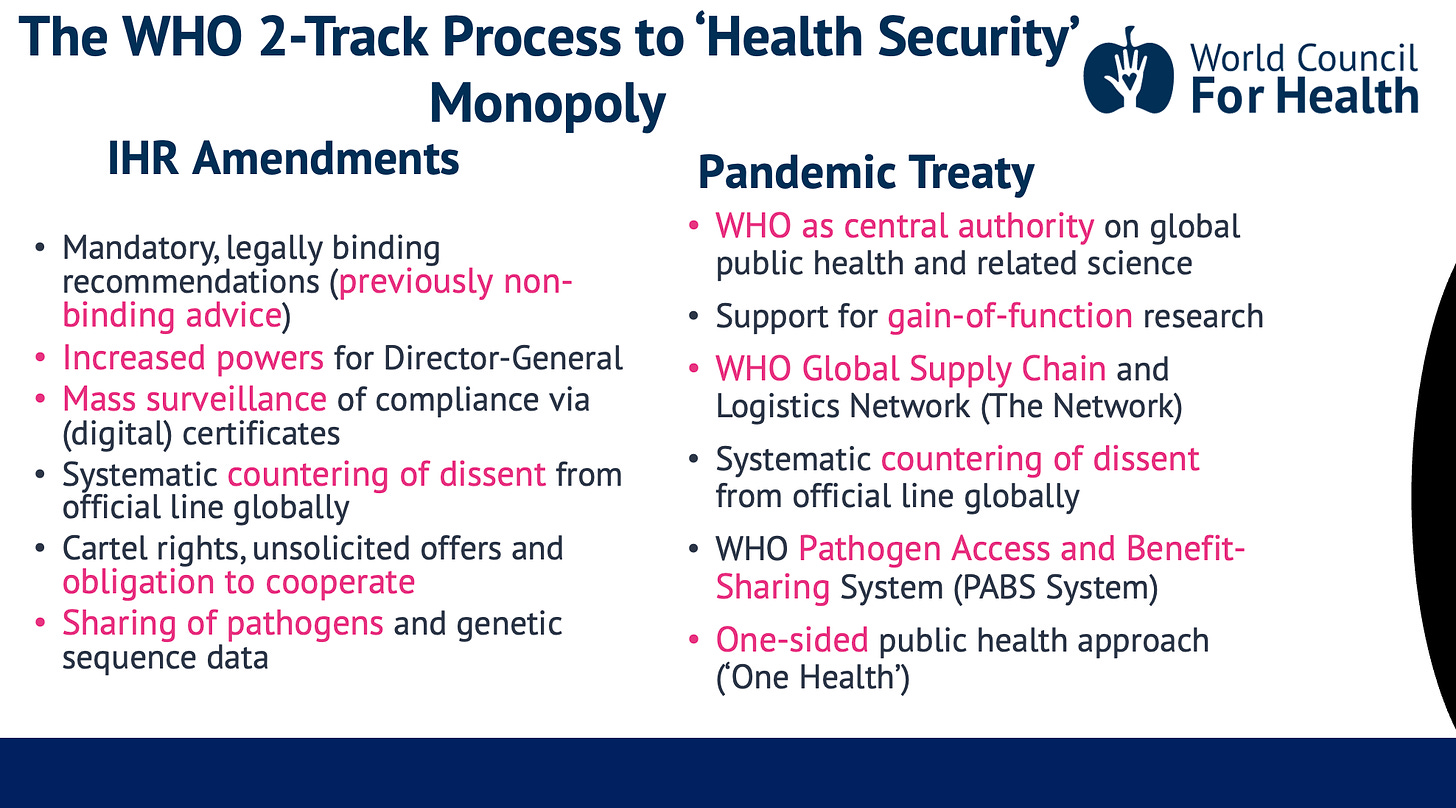
Whilst the IHR and Pandemic Treaty are complementary documents, we are most concerned about the proposed IHR amendments at this stage. As you have heard from other speakers, the IHR is a legally binding document, amendments to which may be adopted through a simple majority vote by unelected representatives at the World Health Assembly this May.
However, both legally binding documents would effectively put the WHO in charge in the event of further public health emergencies of international concern (PHEICs). With the power to unilaterally declare pandemics or PHEICs and dictate the international response, these documents could effectively create a self-perpetuating pandemic industry.
“On Saturday I declared a public health emergency of international concern…”
Perhaps you are comforted by the notion of a supranational body taking control in the event of future PHEICs? If so, please consider for a moment the monkeypox PHEIC. On July 22, 2022, the unelected WHO Director-General overruled the majority of the WHO’s IHR Emergency Committee and declared the monkeypox outbreak a public health emergency of international concern (PHEIC). It turned out to be a fake PHEIC, which quietly fizzled out when no one was looking.

So, imagine giving the WHO’s Director General even greater power. Legally binding power. This would be the case if either of these instruments are adopted without question.
An audit of WHO’s Covid-19 strategies is overdue
During the Covid-19 crisis, governments around the world followed the advice of the World Health Organisation which, from my experience preparing evidence for clinical practice guidelines, was not evidence-based. There was no good evidence to support the implementation of PCR testing, 6-foot social distancing, face masks, lockdowns, or mass inoculation. But there was evidence to support early treatment and prevention strategies with safe, low-cost, established medicines.
With an excellent safety profile, Ivermectin has been given billions of time since the 90’s – yet the public were told that it was not safe to take for Covid-19. In addition, when ethical doctors and scientists shared evidence and experience on safe and effective early Covid-19 treatment options, they were ignored, actively undermined, discredited or censored.
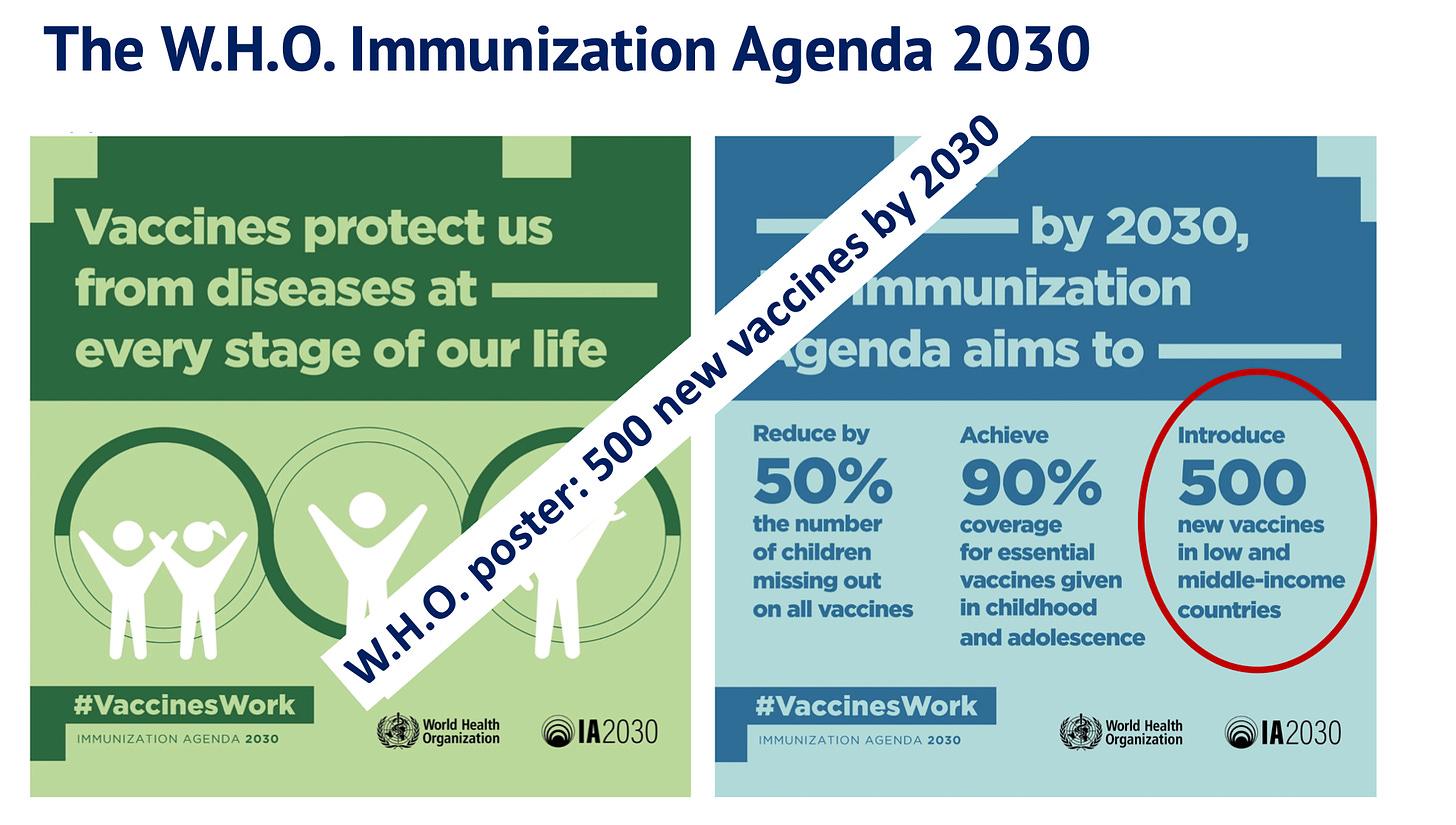
Reflecting the bidding of its funders, the WHO’s focus is increasingly on new-technology genetic mRNA vaccines, promising us 500 new vaccines by 2030. Before we expand the power of this unelected organisation whose scope of work is extensively influenced by its funders, shouldn’t we first do an audit of its Covid-19 performance?
Analysing WHO’s Vigiaccess.org Covid-19 ‘vaccine’ data
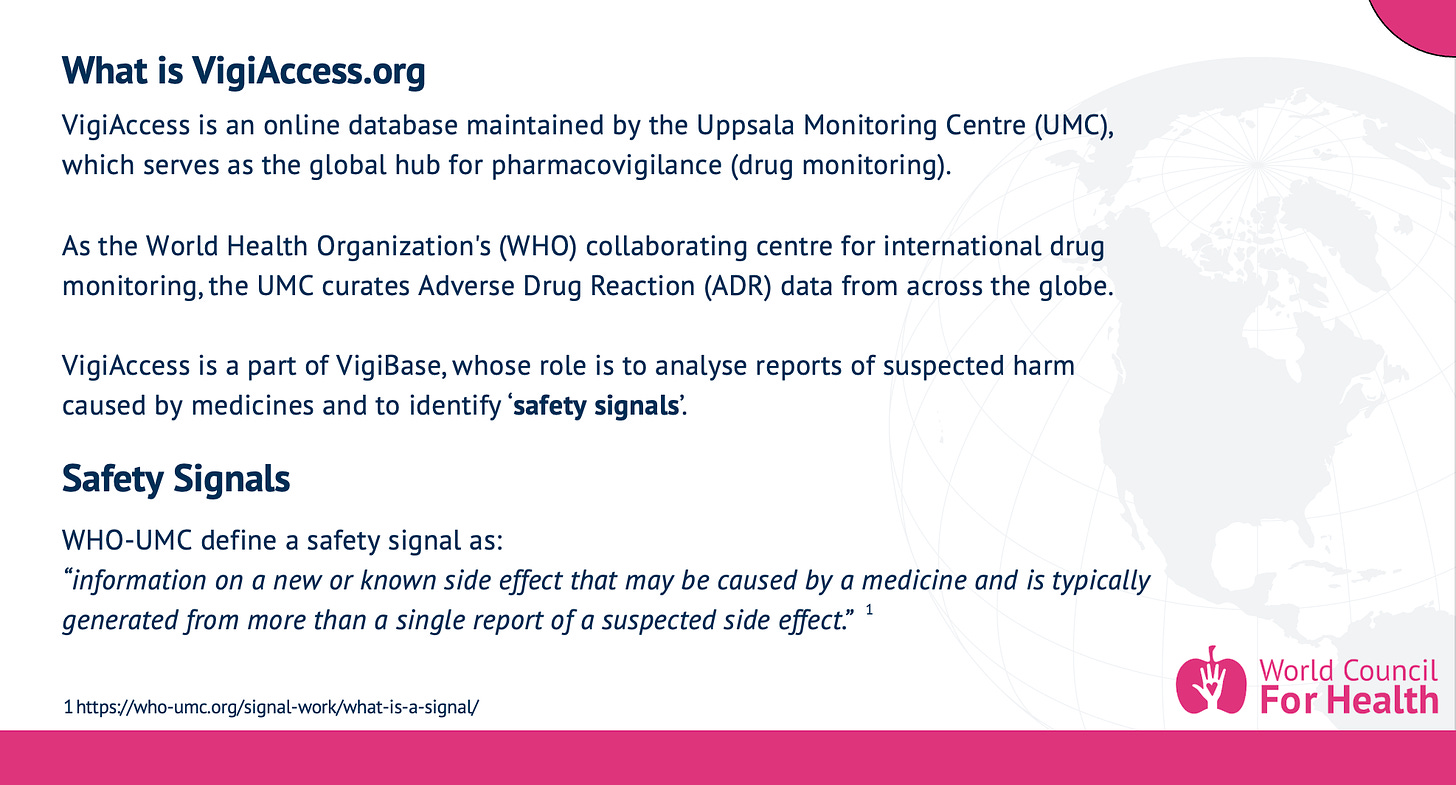
The WHO-Upsala Monitoring Centre Collaboration holds one of the most important drug safety databases in the world: Vigiaccess.org – already mentioned by Dr Billy Ralph. During the past 4 years, the WHO has told governments and the public that Covid 19 vaccines are safe –in the absence of doing an independent safety audit of its own database!
Thus, our World Council for Health research team is currently analysing Vigiaccess.org data for the 26-month period from December 1, 2020 to January 31, 2023. This is what we have found so far:
Almost 5 million people were reported to have over 23 million adverse events during this period. Out of the approximately 5 million people, over 1 million people had at least one serious adverse event (SAE) reported. Serious adverse events are debilitating and life-threatening conditions and death. Over, 58,000 people were reported to have died from the Covid-19 vaccine during this 26-month period.

Approximately 70% of cases were reported by professionals. The majority of vaccine harms data were derived from Europe and America, with Europe accounting for approximately 700,000 cases of serious adverse events and 15,000 reported deaths. Sixty-four percent of reports of death after vaccination, equivalent to approximately 37,000 people, were from the American continent. The majority of serious adverse events occurred for the 18 to 64 year age groups, and the majority of deaths reports were for the over 65 year age groups.
Sixty-one percent of serious adverse events and 42% of deaths were among women. However, especially concerning are the data on children, with 21,590 serious adverse events reported among children, including four hundred and forty-four (444) child deaths. Children were not a high risk group for Covid-19.
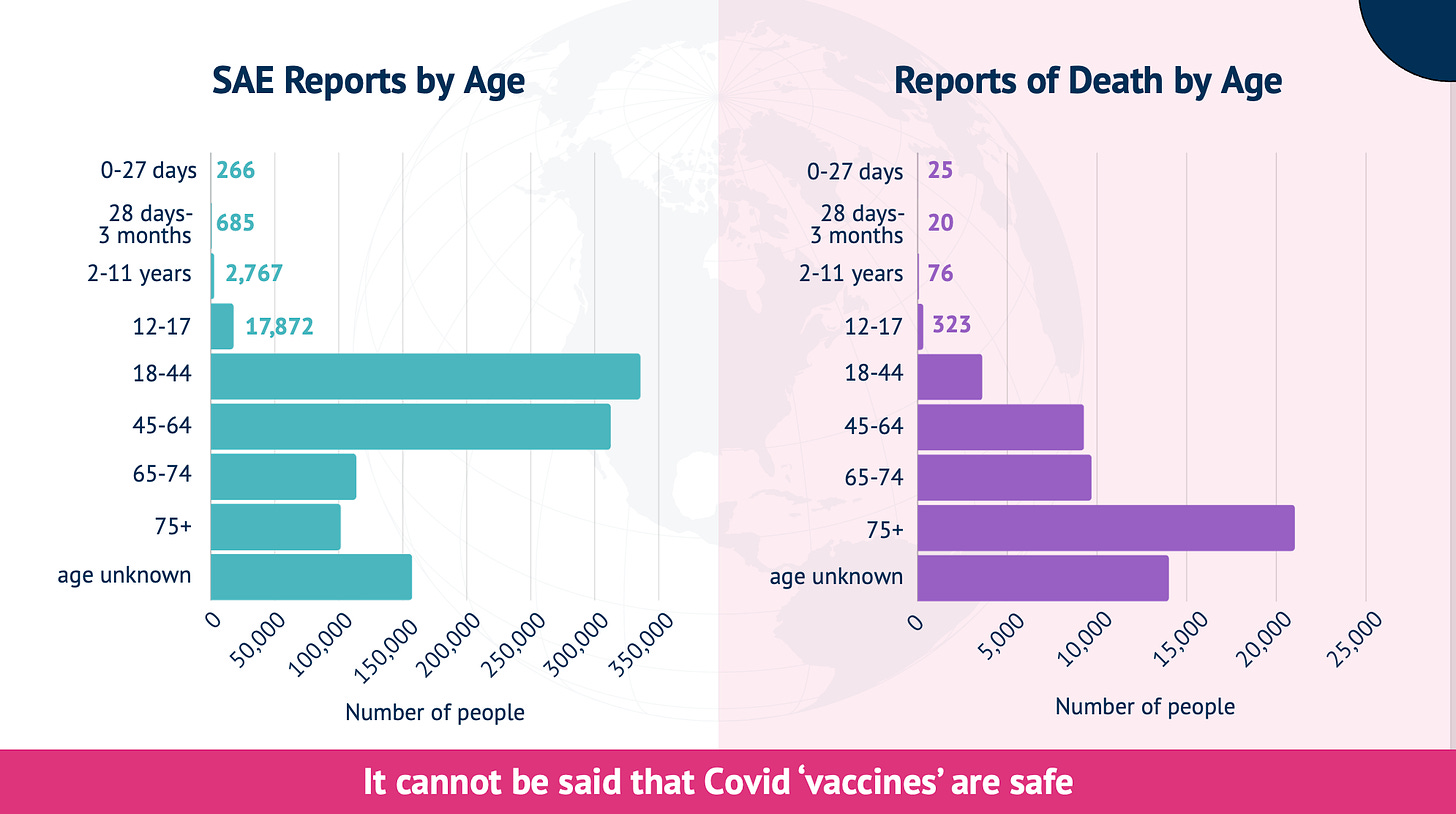
For 34% of death reports there was no associated serious adverse event. Other reports were most commonly associated with infections, cardiac and nervous system Adverse Drug Reaction categories. Further analysis of these data are in progress.
It cannot be said that Covid-19 ‘vaccines’ are safe
Of course there are many limitations to these data. Some of these are that:
-
Without data on the total number of vaccine recipients, causation cannot be conclusively determined.
-
Adverse drug reactions are substantially underreported – estimated at less than 10% of the true number, although Dr Billy Ralph said this figure could be a low as one percent.
-
The reports in this database have not been subject to follow up, so we do not know whether these individuals recovered, experienced a deterioration in their conditions, or succumbed to the reported adverse events. And,
-
WHO has significant conflicts of interest.
An urgent independent and transparent audit of the entire database is needed, including how and why this international health authority ignored the safety signal on its own and, arguably, the most important international drug safety database. Based on the WHO’s Vigiaccess data, however, it simply cannot be said that the covid vaccines are safe.
What is also clear, is that human health, freedom and sovereignty are under serious threat.
The failure of international governments to hold the WHO to account over its harmful Covid-19 strategies, and to act decisively to reject this supranational power grab, suggests that governments may no longer be in charge of country policy-making.

Let’s work together to stop this power grab!
So I ask you now, could it ever be acceptable to transfer decision-making powers reserved for democratic institutions to an unelected, unaccountable body not subject to constitutional or control mechanisms? I invite you to work together with us to stop this expansion of power of the WHO and of the supranational entities controlling it.
Rest assured, that there is a better way for health and democracy.
Thank you for your kind attention.
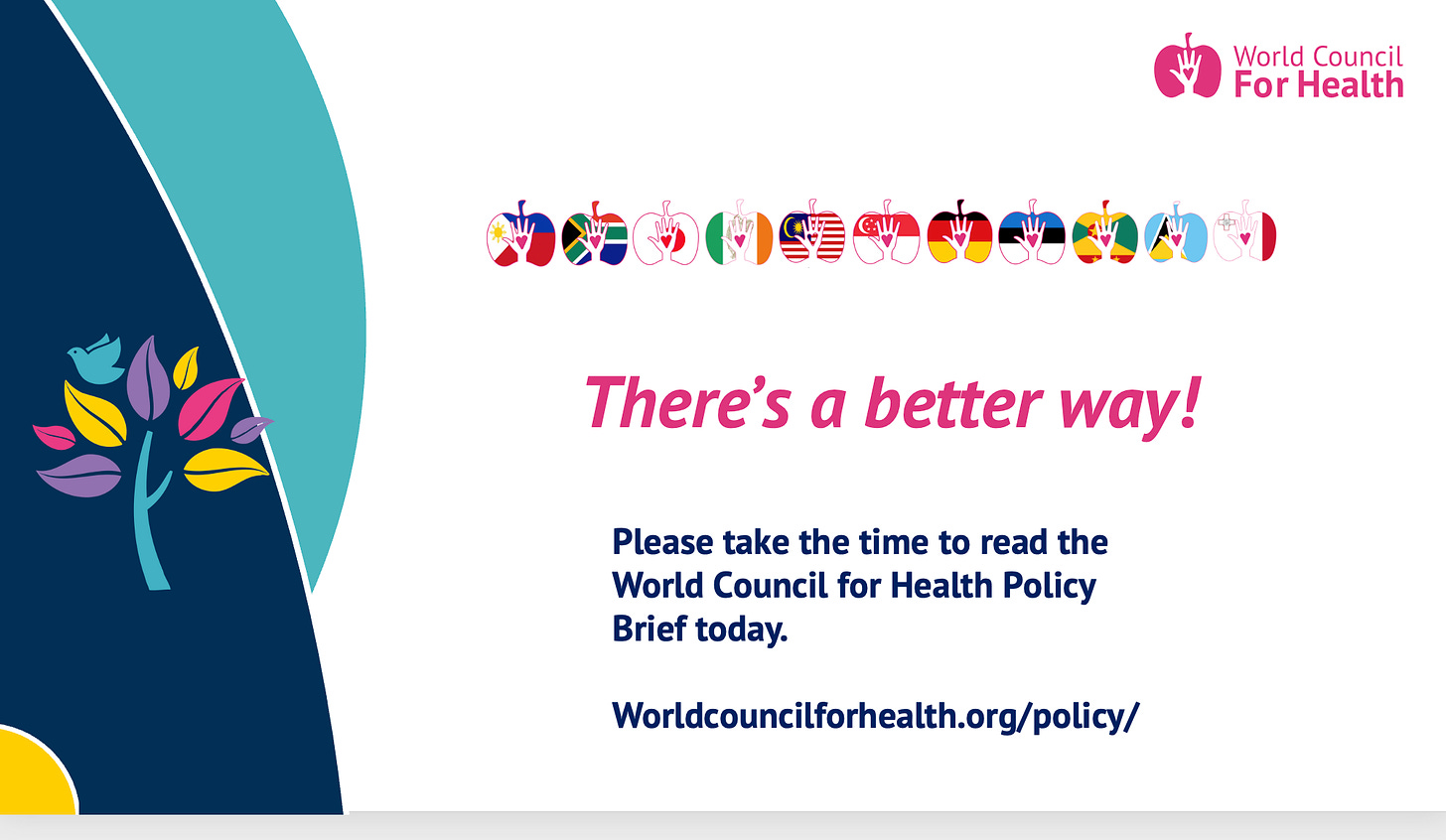
Value Exchange
The World Council for Health Team is on a mission to help humanity. Make it your mission to support us.
If you find value in these Substack articles, please consider becoming a paid subscriber. All proceeds go to the work of the World Council for Health. You can also make a one-off donation or become a regular monthly donor in 2024 to support our expanding WCH team and humanitarian work.




